Israeli Scene
Life + Style
Awe & Memory: The Yom Kippur War Forty Years Later
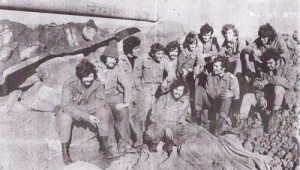
All photos courtesy of WikiCommons.
On October 6, 1973, Egyptian and Syrian forces attacked Israel, starting the cruelest war in the Jewish state’s history. Three weeks later, Israel had turned back the two-pronged invasion—at the cost of more than 2,500 dead. To mark this solemn anniversary, Hadassah Magazine put together a small collection of stories, based not on the totality of the war but on individual memories, incidents and feelings—an abandoned street, an interrupted synagogue service, a blaring siren, carrying bodies of the dead, a loss of trust and a renewed sense of Zionism. Some of the stories that follow come from the war front, others from as far away as America. All are reminders of the sacrifices made to build and defend a nation and the unresolved pursuit of peace. Forty years later, Egypt and Syria are in chaos; their armies pose no threat but their instability does. Israel is flourishing in many ways but remains encircled by hostile forces and haunted by distant memories.
Wrapped in a Cocoon, by Esther Hecht
The Yom Kippur War caught my husband, Shraga, me and our infant daughter in a small town in Pennsylvania at the tail end of a four-month camping trip. We had been blissfully far from the buildup of tension. But the moment we heard—just after Yom Kippur services—our first instinct was to go home, to Israel.
When we got to New York, the planes to Israel were taking only able-bodied men. And once Shraga left, there was no way to communicate. Worried and anxious to get home, I flew with my daughter to Amsterdam a few days later, and there we waited in the airport for nearly two days before we could fly to Israel.
In Jerusalem, the streets were strangely empty—there were so few men. The temperature had dropped suddenly, earlier than usual, and it was cold. During the day, I played quiet games with my daughter, who had just learned to walk and talk. A blackout was in force, so at night I covered the window with a blanket and sat up late watching the mind-numbing detective series that were being broadcast to help people relax. I found this cocoon-like existence congenial; I could almost pretend there was no war, that there was nothing to worry about.
But the lack of communication bred rumors, often cruel ones. A stranger phoned our next-door neighbors and told them their son-in-law had been killed in action. Their daughter was pregnant, and for fear she would miscarry they kept this terrible news to themselves. It turned out to be a lie.
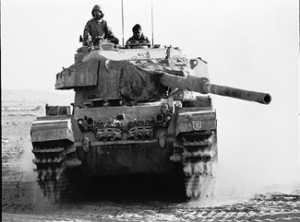
And then, about a week after our return, Shraga was at the door, sweaty and unshaven but smiling. He had traveled many hours from the front to spend one day with us, and it was so good to be together again as a family. He told me nothing of his gruesome experiences. Instead, his stories, like the ones he would write later in postcards, were humorous anecdotes and jokes he had picked up. Somehow, I didn’t find it odd.
It was six months before he was home for good and we could resume life as a family. Nine years later, Shraga bumped into a doctor who had been in the trenches with him. They shared a horrible knowledge that bound them together, though they had been total strangers before the war. That encounter, a few months before the First Lebanon War would again take Shraga away, made me realize how much I had been sheltered, how much I had been spared.
Esther Hecht is a frequent contributor to Hadassah Magazine.
Watershed, by David W. Weiss
The morning of the third day, my wife, Judy, is walking on one of the nearly deserted streets of Rehavia with our youngest son, Jeremy, who has just turned 10.
“Grandma must be scared for us,” Judy announces as they enter the shelter, shifting the fear she senses to far-off Philadelphia.
“Not as scared as I am,” Jeremy says quietly.
We had made aliya with our three young boys shortly before the Six-Day War. In the years since our move, the children had never expressed fear. Not when they were taught not to pick up things they might find in the streets because Palestinian “freedom fighters” were setting trinkets with explosive charges in places where children gathered. Not during the attrition on the Egyptian border when adult conversation frequently turned to the latest casualty reports. Not even when Judy narrowly escaped death as a grenade exploded close to her in the supermarket.
Until the outbreak of the Yom Kippur War, Israel was a bastion. The great victory in 1967 had proved our strength, for all the ongoing tension on the borders and the fierce encounters with enemy infiltrators. But now, now, Egyptian divisions have broken deep into the Sinai and Syrian tanks are streaming down the heights above the Galilee. Now, there is whispered talk of panic among Israel’s leadership. And now, the Israel Defense Forces’ assurances ring hollow and deceptive—the IDF whose word had always been unchallenged truth.
I am brought back to my childhood, fleeing across Europe to the tinny sound of promises by statesmen that the Germans will be stopped.
Jeremy and his brothers are painting plywood panels for the sukka’s walls—pomegranate trees laden with fruit. Only what I see really isn’t fruit. They are globs of blood. The blood of my beloved little cousin, Erika, who was killed in the roundup of the Jews of Hungary in 1944.
I desperately want to fight, but I am too old for combat service. I spend the days of the war driving my car between Jerusalem and the Jordan Valley, giving lifts to soldiers to and from the line.
Israel has not recovered from the trauma of October 1973. Not our confidence. Not our trust.
David W. Weiss is an author and professor emeritus at the Hebrew University–Hadassah Medical School in Jerusalem.
You’re to reoccupy one of our abandoned strong points in the Bar Lev Line.”
“Us?”
We’d never fired a shot in anger! Not to mention that we’d had to give our Uzis to another reserve unit that had not received any weapons at all. At the last minute we were given a “bonbonnière”: six hand grenades in a box to be used in self-defense. A teammate asked how to use them; his national service had consisted of three years in the Army printing office. I begged him not even to try: I reckoned he was more dangerous than any Egyptian.
Anyway, here was this motley collection of unseasoned artillery technicians entering the position, along with the crews of four small mortars—five half-tracks in all. Our officer had told us how he was so far from religion that on Yom Kippur he and his friends got together to play poker and eat roast pork. I don’t suppose he knew that it was now Sukkot.
Although the Egyptians hadn’t overrun the base, the scene was of panicked flight: personal belongings abandoned, dust and dirt—and no electricity. The officer came up to me and said: “Yehoshua, you’re observant. It’s now Thursday—by the time Shabbat comes in tomorrow, I want the synagogue clean and ready for services!”
Friday evening, the defenses manned by other soldiers, every single member of our artillery battery crowded into the little synagogue, with our officer making sure of due decorum. By the light of a single candle, the wireless operator, father of six children, read the complete service aloud; those who were familiar with the words (only one or two of us) said them with him, those who were not answered “amen” with everyone else. There was no wine, so the wireless operator made Kiddush on a couple of biscuits. Afterward we sang zemirot and Israeli songs in the dark; someone wanted to sing a pop song. The officer told him that if he wanted to sing that kind of song, he’d have to go outside.
On Sunday morning, the Egyptians launched their ill-fated attack. They reached a point within 262 feet of our perimeter; our mortars were firing as fast as they could. We were sent to carry additional rounds from the ammunition dump. I was wounded in the arm and sent back to the shelter.
In the entrance, the wireless operator was lying dead.
Yehoshua Sivan and his wife, Hilary, came on aliya in 1966. He is a retired chemistry teacher.
Through Fog, a Clear Message, by Allen Hoffman
Even 40 years later, recalling the Yom Kippur War is disturbing and diffuse. Whoever heard of a 40-year retrospective? Ten, twenty-five and fifty years invite evaluation and introspection, but forty? Forty was the arbitrary number of years the Jews were wandering in the desert. Getting our act together is not an exercise that memory relishes. In retrospect, the entire Yom Kippur episode seems inchoate and much remains a blur. Various disparate images, moments and even scenes claim authenticity, but I cannot attest to their verity as they are culled from the realm of confusion and despair.
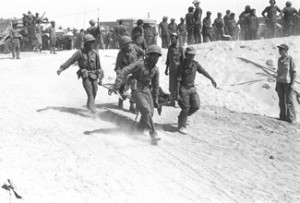
It was Yom Kippur, and a middle-aged man in suit and tie whom I didn’t recognize appeared on the steps of my Upper West Side shteibel in New York as the congregation was returning for Minha and Neila. In the accented English of a European survivor, he announced that a war had started in Eretz Yisroel. His voice trilled with fear and excitement, even horror—he was a refugee announcing the latest conflagration. Having delivered his fateful message, he vanished. I never saw him again.
We were somewhat dazed as we entered to pray. A blowhard in the minyan asserted there was nothing to worry about because his cousin, a high-ranking officer in Israeli Army intelligence, told him that a surprise Arab attack on Yom Kippur was no problem, but the Seder night, when everyone was drunk, was another matter. My wife and I had experienced the Six-Day War in Jerusalem as hospital volunteers, and we had witnessed the suffering and the sorrow. The smug hubris of the uninvolved and the uninitiated grated.
After the fast, we began the television vigil, but that, too, proved intolerable. Things were not going well, but the false bravura of the Israeli generals continued unabated. Anxious and so distant, I was unable to concentrate, much less work. I found myself reaching for Irving Howe and Eliezer Greenberg’s A Treasury of Yiddish Stories. I read and reread the artful but honest voices of vulnerability, uncertainty, frailty and tragedy. Grateful for their companionship, I managed to control my anxiety and navigate those treacherous days.
I attended a pro-Israel rally in Lower Manhattan. On a dais, Abba Eban, his jowls radiating indignation, declaimed that the Arabs, in addition to their other horrendous faults, had committed “the sin of blasphemy” by attacking on Yom Kippur. As false as it was foolish, we were compelled to applaud. Embarrassed and frustrated, we dissolved toward the nearest subway entrance. In the anonymity of the tiled tunnels, I welcomed and was calmed by the genuine mechanical roar of the trains.
I embraced my return to the privacy of the printed page and immersed myself in those Yiddish short stories. Even I.L. Peretz’s “The Dead Town” was not a fossilized artifact of a world that had lived upon the precipice. Although the narrator informs us that the dead town “hung…by a thread,” the story weaves the fractious and degenerative public drama into a brutal, searing critique in which corpses throb with life.
Isolated and alienated as I was, I preferred the hushed, feathered horror of Moishe Kulbak’s Munie the Bird Dealer’s acceptance of his self-inflicted fate in the story of the same name. Cuckolded, the bird dealer enters the pigeons’ cage and hunkers down in stolid silence. In metaphor a tortured world becomes comprehensible. In our real world, we continued to pray and to celebrate Sukkot, Shemini Atzeret and Simhat Torah, but it was in those stories from a world I never knew that I found repose and even solace.
Even times of turmoil come to an end. I have no idea where I was when I heard about the armistice.
As for the stories, their power lingers, although the plot lines remain confused, the characters misremembered and the settings inexact.
One thing, however, emerged with fierce clarity and still remains crystal clear: In times of trouble, the only thing worse than being in Israel is not being in Israel. Two years later, we arrived with our two young daughters to live in Jerusalem.
Allen Hoffman is a writer who lives with his family in the Jewish Quarter of Jerusalem’s Old City.
Strange Customs, by Barbara Goldstein
Forty years have passed since the most unforgettable Yom Kippur of my life. My husband, Mordy, our three children and I arrived in Jerusalem in August 1973 for our long anticipated Zionist sabbatical. We settled into our apartment in Beit Ha-kerem and put the kids in elementary and nursery school. I started volunteering in the PR department at Hadassah–Ein Kerem. Mordy, a cantor, was looking forward to shul-hopping to hear the great cantors of Jerusalem.
Yom Kippur eve, on our way to the Kings Hotel, we saw helicopters landing at the Knesset. I thought it strange and ominous but wasn’t frightened. On Yom Kippur morning, I sat in the first row of the balcony of Yeshurun Synagogue on King George Street with the children. At 1 P.M., we were singing the “Aleinu,” the central prayer ac- knowledging God’s sovereignty in the world, and all the men are prostrating themselves before God (something I had never seen in the States). Then began what I assumed at first was another unfamiliar custom: men running around the synagogue tapping dozens of others who jumped up and, with their talitot waving, left the sanctuary. I asked the woman to my right what was happening. “Nothing good,” she whispered.
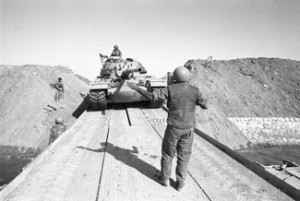
I took the kids outside. I couldn’t believe my eyes: Dozens of half-tracks with hundreds of young and middle-aged men jumping onto the vehicles with their kittels, talitot and mahzorim! I understood that war was upon us. I walked to the intersection of King George and Agron and someone with a transistor heard the BBC reporting on the surprise attack from the south and the north.
The solemnity of the day was broken. At Neila, we cried: “Seal us, o God, in the Book of Life.” More than 2,000 of Israel’s sons, husbands and fathers sacrificed their lives.
Barbara Goldstein is the deputy executive director of Hadassah’s Office in Israel.
Delivering the Message, by Abraham Rabinovich
When the war broke out, I was one of the few men left at The Jerusalem Post. I went to Hadassah Hospital to talk to the first wounded back from the Sinai front: They spoke of fierce tank battles. Later that week, I drove north with an American colleague who had just arrived.
The fields of the Upper Galilee were tufted with cotton but the men who should have been harvesting the crop were on the Golan Heights above the valley or in Sinai. To this day, the sight of cotton fields brings me back to the war. With military police blocking the roads to the Golan, I found a dirt track that took us around them and we made it to the top.
The soldiers we talked to were exhausted after days of battle, their mood uncertain. Driving past Kibbutz El Rom, I pulled over to let a malfunctioning Sherman tank pass. It was barely moving but its engine was roaring. It was, for me, a metaphor for the way the war was going—maximum effort but little movement. Something was wrong.
The mood had completely changed when I visited a rear position in Sinai a week later. A tank company was refueling while artillery pieces nearby fired toward the Suez Canal. A handful of tank officers were gathered around a map laid on the back of a tank. All were in their early twenties. Their unshaven faces were covered with gunpowder and soot but they exuded confidence and competence.
The company commander said they had been in combat since the war began 12 days earlier. They had been ordered to pull out for rest but the crews refused. When they heard I was from The Jerusalem Post, the officers summoned a tall, pleasant looking young man whose arm was freshly bandaged from elbow to wrist. His name was Alan. His father was a doctor in Los Angeles, but he had not been in contact with his family since immigrating four years ago. When released from the Army in a few months, he said, he would be going to visit.
“Not that I want war, but this is what I came for,” he said of his experiences directing artillery fire.
A few weeks after the war, someone telephoned me on behalf of Alan’s sister, who had seen my article mentioning him. The family had not heard from him since the war ended. Did I know where the men he served with were from? Two of them, I remembered, were from Kibbutz Beit Hashita.
Some time later the family notified me that his body had been identified. I wrote them Alan’s last words when we shook hands and parted: “I feel fulfilled.”
Abraham Rabinovich is the author of six books, including The Yom Kippur War: The Epic Encounter That Transformed the Middle East (Schocken) and The Battle for Jerusalem, June 5-7, 1967 (Sefer Ve-Sefel).
Who by Fire? By Rochelle Furstenberg
The Yom Kippur War came on us with apocalyptic force. The sirens shattered the hushed silence of Yom Kippur, and the pride of ’67 came before the fall of ’73.
Sitting in the women’s balcony of a Jerusalem synagogue, we frantically pounded heaven’s gates. During the break, we opened our radios to discover that the Egyptians had broken through the Bar Lev Line, the chain of fortifications on the Suez Canal. We returned to the synagogue for the closing Neila prayer, the cantor beseeching “open the Gates of Heaven.” The shofar blower was still confident as his blasts ended the Day of Atonement. But the weeks and months that followed eroded our confidence.
Friends and sons of friends were killed and wounded. And in the confusion of the surprise attack, many were missing. Israelis lived in dread for weeks and months, waiting to hear the fate of loved ones. Rumors abounded. A missing soldier had been seen here, another there. A colleague put an ad in the newspaper with his son’s picture, begging anyone who had seen him to please contact the family.
For many weeks, there was no news of our friend, David Katz, a South African-born sociologist on reserve duty at the Bar Lev Line. After the war, fellow soldiers described the shock they felt as they saw Egyptian boats making their way across the canal.
“David was on the southern lookout, had said his Yom Kippur prayers and was shooting fiercely,” said one of his comrades. “I couldn’t believe that this sweet, innocent man could fire like that. But ultimately he was wounded. He cried ‘Shema Yisrael’ and died a half hour later.”
“There was no choice but to abandon the fortification…and leave the dead,” his officer later explained. Katz was one of many “missing” until identified long after the ceasefire.
The following Yom Kippur, the blasts of the shofar were no longer confident. It sputtered, sighed and cried for the people of Israel.
Rochelle Furstenberg is a regular contributor to Hadassah Magazine.
Gaon’s Promise, by Barbara Sofer
I thought the siren in the midday break of Yom Kippur services in Jerusalem was an electrical malfunction. Israel was experiencing a boom; Moshe Dayan had predicted a decade of peace. When the siren sounded again, I heard footsteps. My upstairs neighbor was running down to unlock the bomb shelter. A devout Jew, he nonetheless urged me to turn on my radio.
Usually silent on Yom Kippur, Kol Yisrael was broadcasting quiet classical music. I went upstairs. My neighbor, Syril, was packing turkey sandwiches and honey cake for her son-in-law, Eli Wertman, to break his fast. A Hadassah medical student, he had taken a year off to study in a yeshiva. Now he was wearing his IDF officer’s uniform and driving off on Yom Kippur. I realized we were at war.
In addition to teaching high school English in the morning and going to graduate school at night, I sold appliances in the afternoon. That meant I owned a TV. Friends carrying flashlights because of the blackout came to my basement apartment to watch the news.
“By the time you get this,” I wrote my parents in Connecticut, “I’m sure this will have blown over.” I had no idea how dire our situation was.
Four months stretched between Yom Kippur and the disengagement of forces. Schools were closed, so I joined the volunteer corps. First, I was dispatched to the Cohen, Kahana and Halili packing plant, a decrepit warehouse where most of the city’s flour was bagged. I folded a thousand kilo bags of flour a day, and when the sealing machine broke down, I stuck my finger into a glue pot, sealed the bags and slapped them upside down. Later, I was drafted to help run a school reopening in a development town.
My last assignment was to teach wounded soldiers in a convalescent home. In Hebrew, a “four-eye conversation” means private talk. My wounded students would say, with black humor, that they could have “a four-eye conversation among four.” They scheduled a dance. Policewomen were bused in to supplement women dance partners. One macabre evening, I boogied with men in plaster casts and head bandages—to Elvis, Greek singer Aris San and a new group called Kaveret. The most popular song was a haunting ballad, “The Last War,” by Yoram Gaon, in which he sang: “I promise you, my little girl, that this will be the last war.”
That promise has proven false. On crutches, Eli returned to medical school after the war. Like him, the nation moved slowly toward healing. Today, he’s a senior neurologist and bereaved father: His son was killed in Operation Cast Lead.
Barbara Sofer is Israel director of public relations for Hadassah, The Women’s Zionist Organization of America.
An Endless Night, by Shraga Hecht
When the war started, I returned from a vacation abroad on the first flight I could get. I was 35 and no longer had a regular reserve unit, so at the airport in Israel I was told to go with a unit of much younger guys. And because in the Army you’re always rushing to wait, I waited with them, drinking coffee and shooting the breeze.
When the order came to move, we weren’t told where or for what.
As a soldier you don’t know much, but you have “General Rumor,” who knows it all. And as a soldier with no unit, you just drift; in a war they don’t know what to do with you, especially if, like me, you have an old rifle that doesn’t work. So they send you from place to place. I just kept moving, trying not to make waves.
And then, a few miles east of the Suez Canal, I saw a long line of halftracks full of excited young soldiers on their way to cross the Suez Canal, to reach what we called Africa. Someone called to me to jump on and come with them, but there was no room. So I stayed behind as they moved on.
Soon after, our jets attacked, their bombs joined by artillery fire, and I quickly took cover. It was night when a captain found me and three other guys and asked us to help him. We rode with him for three or four miles. There had been a huge Egyptian ambush, and lining the road were the half-tracks I had seen earlier, all burned out. The captain showed us a big crater where they had collected the dead and wounded and asked us to run across the road and look for more wounded soldiers in the field.
All night long we carried the dead and injured to the crater. It was so dark we couldn’t tell who was Israeli, who was Egyptian. We just kept bringing them. The captain, a doctor, did his best with the help of the medics. Helicopters came and evacuated the dead and wounded, and they kept on coming.
When the sun rose, we could finally see the field. It was already hot, and flies buzzed by the hundreds. We started smelling the sweet stench of the bodies still lying there. And we continued moving the wounded, both Israelis and Egyptians.
I don’t know how long I was there, but it seemed as though it would never end. Two days later, we crossed the canal and I remained in Africa till the war ended. But that night in the crater never ended for me.
Shraga Hecht is a tour guide living in Jerusalem.








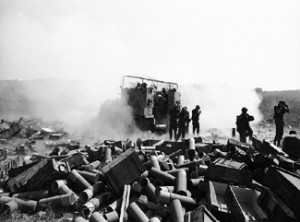
 Facebook
Facebook Instagram
Instagram Twitter
Twitter
Deborah Freeman says
What stories and what telling…telling hearts all broken by questions.
I too was in Jerusalem but didn’t know till nightfall ..and even then I understood little. It wasn’t my poor Hebrew it was the broken and breaking!
Thank you all for shedding light.